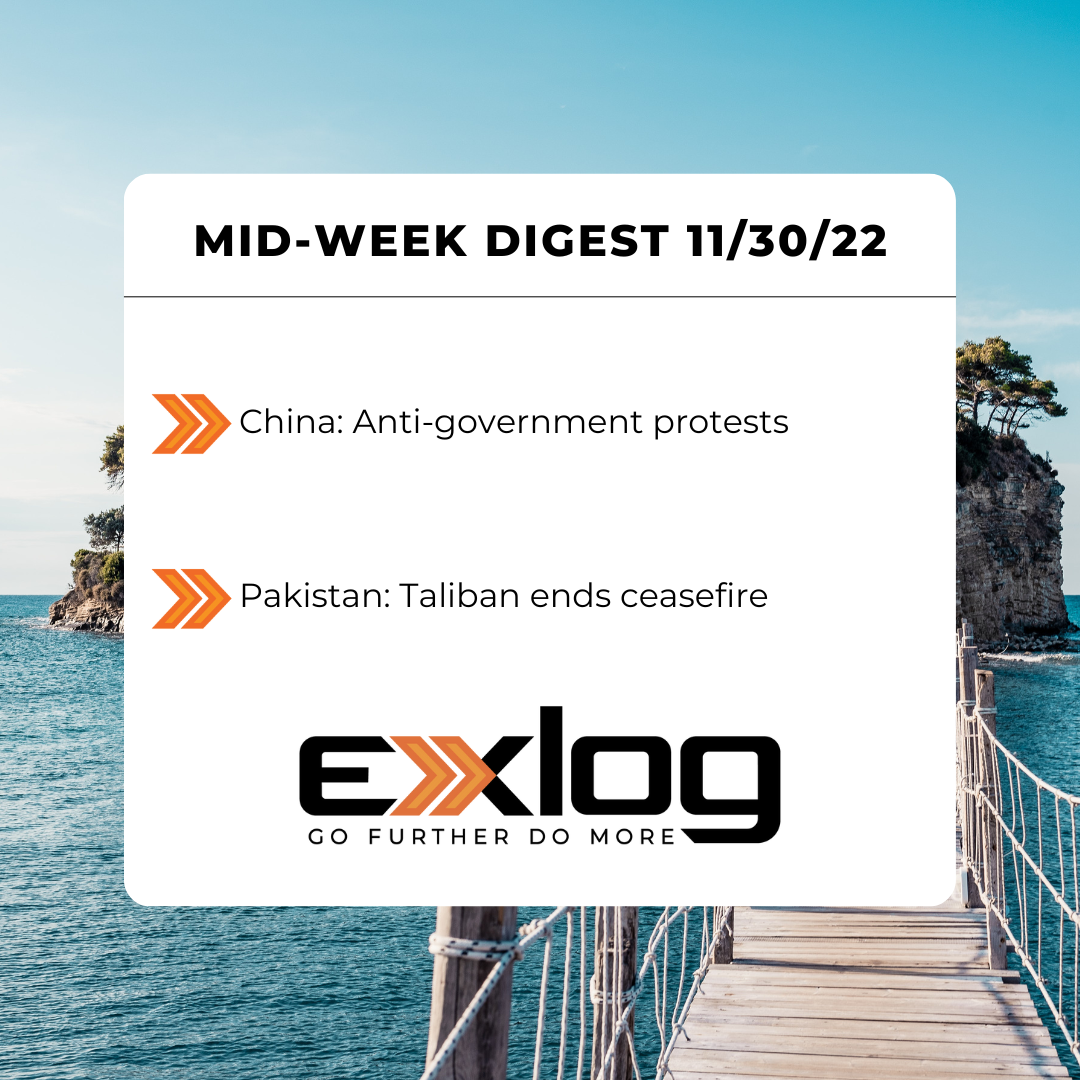Anti-government protests in China and Pakistani Taliban ends ceasefire
China: “Zero-COVID” policies spark rare anti-government protests
Rare anti-government protests have swept at least 16 Chinese cities since Nov. 25, marking the largest wave of dissent in a decade. The unrest has resulted in travel disruptions and repeated confrontations with security forces. The demonstrations started in Urumqi city, Xinjiang province, where residents protested in front of local government facilities to demand an end to pandemic control measures enacted by Chinese authorities as part of the country’s “zero-COVID” policy. The protest came a day after a fire killed 10 people at a residential building in Urumqi; fire response services were unable to effectively respond to the incident due to barricades and roadblocks enforcing a COVID-19 lockdown. The perceived inadequacy of the government’s response to the incident caused protests to spread across the country, including to major economic hubs like Beijing and Shanghai. Additionally, students from more than 50 universities – including Peking University, Tsinghua University, and the Communication University of China – have participated in the protests. While strict COVID-19 measures fueled the initial demonstrations, many of the protests have since taken on a broader anti-government tone, with some participants denouncing heavy censorship and calling for President Xi Jinping’s resignation. The majority of the demonstrations have proceeded peacefully; however, rallies in Shanghai, Wuhan, and Lanzhou escalated to violence on Nov. 26, when protesters clashed with security forces after destroying metal barricades and vandalizing COVID-19 testing booths; police reportedly arrested dozens of people amid the unrest. In a small concession to protesters, officials announced slight adjustments to pandemic restrictions in some areas on Nov. 28 and 29. At the same time, the Chinese government has strongly restated its commitment to the “zero-COVID” strategy, suggesting that major relaxation of restrictions remains unlikely. As of Nov. 29, protests continued in certain cities, with clashes between protesters and riot police reported in Guangzhou. Despite security services’ forceful response to the unrest, the protests – partially fueled by President Xi’s election to a third term as General Secretary of the Chinese Communist Party in October – are expected to persist in the near term and will likely impact travel and business operations in affected regions across China.
Pakistan: TTP ends ceasefire, threatens nationwide attacks
Tehreek-e-Taliban Pakistan (TTP) – also known as the Pakistani Taliban – announced the end of its six-month-long ceasefire with the Pakistani government on Nov. 28, increasing the threat of TTP activity across the country. The group’s leadership encouraged members to resume nationwide attacks, citing a Pakistani military campaign targeting TTP operatives in the Khyber Pakhtunkhwa province bordering Afghanistan. Clashes between Pakistani forces and the TTP have been ongoing in Bannu, Lakki Marwat, Tank, and other districts of the province since at least September. Despite the implementation of the truce agreement in May, the TTP has continued to perpetrate attacks in Khyber Pakhtunkhwa. The group has claimed that these actions are defensive in nature; however, local media reported several TTP attacks deliberately targeting security forces in the Lakki Marwat and North Waziristan districts in recent weeks, and local residents claim to have fallen victim to extortion schemes attributed to the group. While the TTP has waged an insurgency in Pakistan over the past 14 years, the frequency of its attacks – mainly targeting Pakistani security forces – has increased since the Taliban’s takeover of Afghanistan in August 2021. The country experienced a 41% increase in overall terrorist activity between August 2021 and August 2022, compared to the same period the previous year, with the TTP responsible for a majority of the attacks. Following the termination of the ceasefire agreement, TTP activity will likely increase across the country in the short-to-medium term. The TTP claimed responsibility for a suicide bombing targeting a police vehicle in Quetta on Nov. 30, demonstrating its capability and motivation to conduct attacks outside of its main area of operations in Khyber Pakhtunkhwa. While the group’s primary targets are Pakistani government and security forces, TTP attacks against civilian targets or foreign interests cannot be ruled out. There is also a threat of collateral injury and damage, as well as operational and transportation disruptions, in the vicinity of any attack or government security operation against TTP militants.


